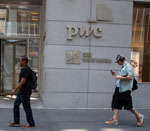 New York Times: New York State’s financial regulator announced a settlement deal with the giant consulting firm PriceWaterhouseCoopers. In 2007 the Bank of Tokyo-Mitsubishi hired PWC to conduct a review of transactions with Iran and other countries under sanctions, including some transfers routed through its New York branch. In the settlement, Mr. Lawsky accused the firm of “improperly altering” the report.
New York Times: New York State’s financial regulator announced a settlement deal with the giant consulting firm PriceWaterhouseCoopers. In 2007 the Bank of Tokyo-Mitsubishi hired PWC to conduct a review of transactions with Iran and other countries under sanctions, including some transfers routed through its New York branch. In the settlement, Mr. Lawsky accused the firm of “improperly altering” the report.
The New York Times
By Ben Protess
 New York State’s financial regulator announced a settlement deal on Monday with the giant consulting firm PriceWaterhouseCoopers, capping an investigation into the firm’s cozy ties with one of the world’s biggest banks.
New York State’s financial regulator announced a settlement deal on Monday with the giant consulting firm PriceWaterhouseCoopers, capping an investigation into the firm’s cozy ties with one of the world’s biggest banks.
The regulator, Benjamin M. Lawsky, extracted a $25 million fine from PriceWaterhouseCoopers. Under the deal, reported by The New York Times on Sunday, Mr. Lawsky will also prevent the firm’s regulatory consulting unit from performing certain assignments on behalf of New York-regulated banks for two years.
The settlement stems from the consulting firm’s work for Bank of Tokyo-Mitsubishi UFJ, a giant Japanese bank. In 2007, as the bank was facing regulatory scrutiny for doing business with countries blacklisted by the United States, it hired PriceWaterhouseCoopers to conduct a review of transactions with Iran and other countries under sanctions, including some transfers routed through its New York branch.
The firm, which eventually submitted a report to regulators in June 2008 detailing the illicit transactions, certified that its work was objective and impartial.
But in the settlement, Mr. Lawsky accused the firm of “improperly altering” the report.
In an initial draft of the report, PricewaterhouseCoopers included paragraphs from a bank manual outlining “special instructions” employees should follow to ensure that transactions with Iran and other countries under United States sanctions did not draw attention. Under pressure from the bank, the consulting firm deleted those paragraphs in the version of the report sent to regulators.
The firm also deleted or watered down a number of other important issues.
Initially, the report said that had the firm known about “these special instructions” at the start of the review, “then we would have used a different approach for completing this project.”
But in the version sent to regulators, PriceWaterhouseCoopers did an about-face. “Our methodology to process and search” transactions “was appropriate,” it said. “We have concluded that the written instructions would not have impacted the completeness of data available” for the review, a conclusion that PriceWaterhouseCoopers originally attributed to the bank, which ultimately paid its own $250 million fine to Mr. Lawsky.
Miles Everson, leader of the firm’s advisory services practice in the United States, said on Sunday that the report was “detailed” and “disclosed the relevant facts.” He added, “This matter relates to a single engagement completed more than six years ago in which PwC searched for and identified relevant transactions that were self-reported to regulators” by Bank of Tokyo-Mitsubishi.
“PwC is proud of its long history of contributing to the safety and soundness of the financial system by serving as subject matter experts in banking regulatory and compliance matters,” he added.
The firm was not accused of a legal violation. Mr. Lawsky, who took a similar action against Deloitte last year, accused PriceWaterhouse of failing to demonstrate the objectivity and integrity expected of bank consultants.
The case is part of a broader examination of conflicts of interest that plague the consulting industry. The consultants are handpicked and paid by the banks they are supposed to examine.
“We are continuing to find examples of improper influence and misconduct in the bank consulting industry,” Mr. Lawsky said in a statement. “As a regulatory community, it may well be advisable for us to take a hard look in the mirror and ask whether we are doing enough to root out and investigate this troubling web of conflicts. When bank executives pressure a consultant to whitewash a supposedly ‘objective’ report to regulators — and the consultant goes along with it — that can strike at the very heart of our system of prudential oversight.”


